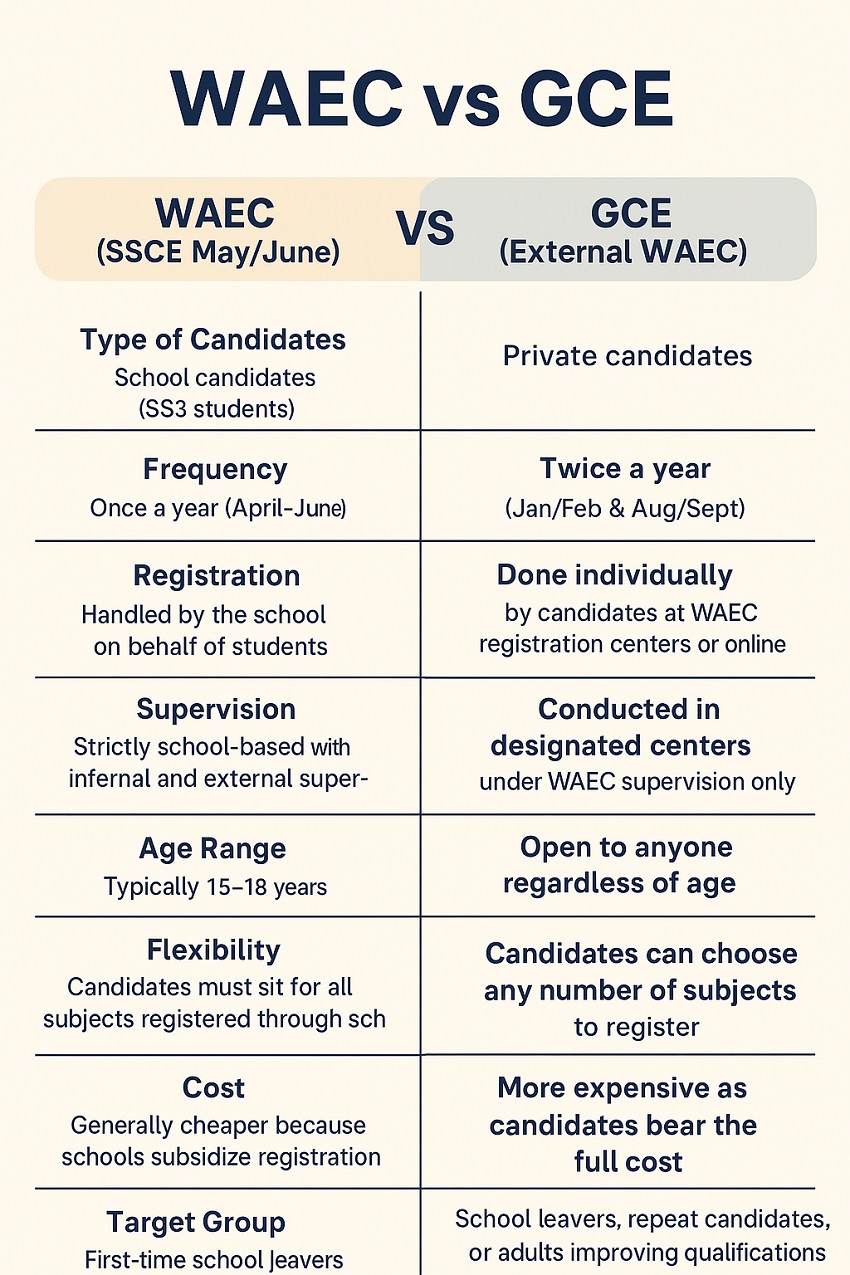When it comes to secondary school examinations in Nigeria and some West African countries, two names often confuse students and parents alike: WAEC and GCE. While many believe they are the same, they actually have distinct features that set them apart. Understanding the difference between the two can help students choose the right path for their academic journey.
In this article, we will explore the definitions, similarities, major differences, admission relevance, and what every student should know about WAEC (West African Senior School Certificate Examination) and GCE (General Certificate Examination).
What is WAEC?
WAEC, which stands for West African Examinations Council, is the regional examination body responsible for conducting the Senior School Certificate Examination (SSCE) across Anglophone West African countries, including Nigeria, Ghana, Sierra Leone, Liberia, and The Gambia.
In Nigeria, WAEC is commonly associated with the May/June SSCE, which is taken by final-year secondary school students. It is a school-based exam, meaning candidates must be enrolled in an approved secondary school to participate.
Key features of WAEC (May/June SSCE):
-
Conducted once a year (usually between April and June).
-
Strictly for secondary school students in SS3.
-
Includes school subjects (core and electives) like English, Mathematics, Sciences, Arts, and Vocational courses.
-
Certificates are used for university, polytechnic, and college of education admissions in Nigeria and abroad.

What is GCE?
GCE, which stands for General Certificate Examination, is an external/private version of WAEC. It is often referred to as WAEC GCE in Nigeria. Unlike the May/June SSCE, GCE is designed for private candidates who are not currently in school or who wish to improve on their previous WAEC results.
There are two series of WAEC GCE in Nigeria:
-
First Series (January/February) – introduced in 2018 to give candidates another opportunity earlier in the year.
-
Second Series (August/September/October) – the long-standing external exam.
Key features of GCE:
-
Conducted twice a year.
-
Open to private candidates (school enrollment not required).
-
Flexible – allows students to combine results from previous sittings.
-
Often used by those seeking admission after leaving school or those improving their grades.
Major Similarities Between WAEC and GCE
Even though they appear different, WAEC and GCE share some similarities:
-
Conducted by WAEC – Both exams are organized by the West African Examinations Council.
-
Same Curriculum – They follow the Nigerian secondary school curriculum and test the same subjects.
-
Equal Recognition – Certificates from both WAEC and GCE are recognized in Nigeria and abroad for higher education or employment.
-
Exam Structure – Both have objective, theory, and practical papers depending on the subject.
-
Entry Requirement for Higher Education – A minimum of 5 credits (including English and Mathematics) from either WAEC or GCE is required for admission into tertiary institutions.
Key Differences Between WAEC and GCE
| Aspect | WAEC (SSCE May/June) | GCE (External WAEC) |
|---|---|---|
| Type of Candidates | Only school candidates (SS3 students). | Private candidates (not tied to any school). |
| Frequency | Once a year (April – June). | Twice a year (Jan/Feb & Aug/Sept). |
| Registration | Handled by the school on behalf of students. | Done individually by candidates at WAEC registration centers or online. |
| Supervision | Strictly school-based with internal and external supervisors. | Conducted in designated centers under WAEC supervision only. |
| Age Range | Typically 15–18 years (secondary school leavers). | Open to anyone regardless of age (commonly older students or repeaters). |
| Flexibility | Candidates must sit for all subjects registered through school. | Candidates can choose any number of subjects to register. |
| Cost | Generally cheaper because schools subsidize registration. | More expensive as candidates bear the full cost. |
| Target Group | First-time school leavers. | School leavers, repeat candidates, or adults improving qualifications. |
| Practical Components | Conducted within schools with school labs and facilities. | Conducted at designated external centers with WAEC-provided facilities. |
| Timing of Results | Released around August. | Released faster (about 45–60 days after exam). |
Which is Better: WAEC or GCE?
There is no absolute “better” exam between WAEC and GCE. The choice depends on the candidate’s situation:
-
WAEC (May/June SSCE) is best for students currently in school and writing their final exams.
-
GCE (External WAEC) is ideal for:
-
Those who did not perform well in WAEC.
-
Those who are no longer in school.
-
Adults seeking O’Level results for admission or employment.
-
Admission Relevance of WAEC and GCE
Both WAEC and GCE certificates are accepted for:
-
Admission into Nigerian universities, polytechnics, and colleges of education.
-
Foreign admissions, especially in the UK, Canada, and the US.
-
Employment purposes, both locally and internationally.
However, many universities emphasize having at least five credits in one sitting (though some allow two sittings). GCE is therefore an option for candidates who want to combine two different results to meet this requirement.
The confusion between WAEC and GCE is common among students, but the differences are clear once examined. WAEC is the school-based exam, while GCE is the external/private candidate version. Both are equally valid and recognized, but they serve different purposes depending on a candidate’s academic journey.
For students still in secondary school, WAEC is the direct route. For those who missed out, want to improve their results, or are returning to education later in life, GCE provides an excellent opportunity.
Ultimately, what matters most is preparation and performance. Whether you choose WAEC or GCE, securing good grades in English, Mathematics, and other core subjects will determine your success in gaining admission or pursuing future career goals.